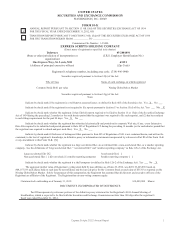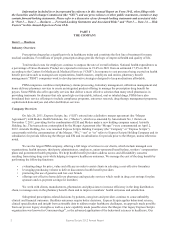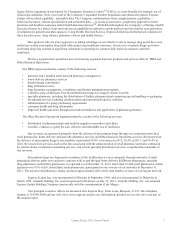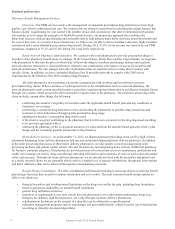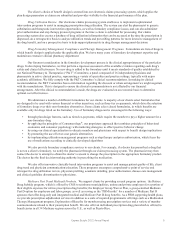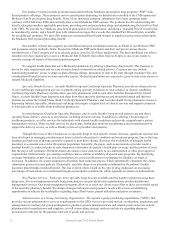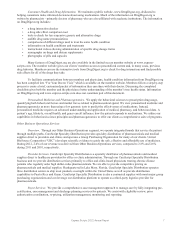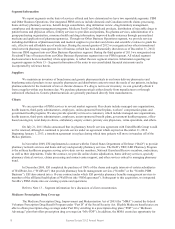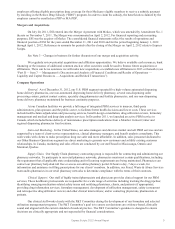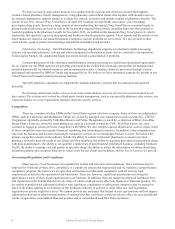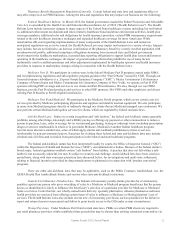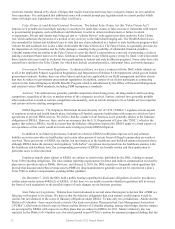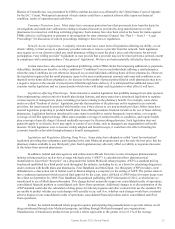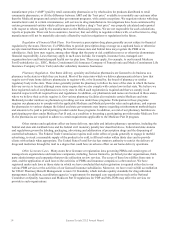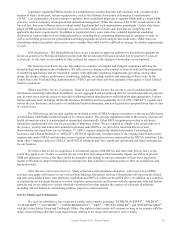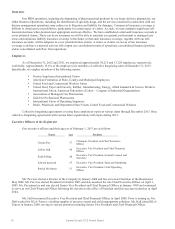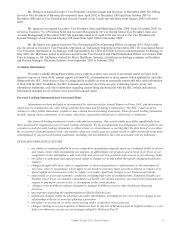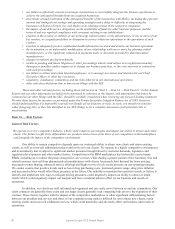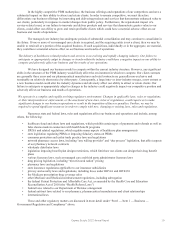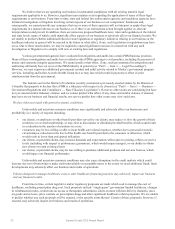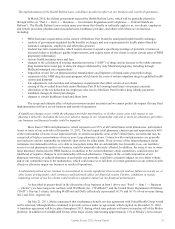Express Scripts 2012 Annual Report Download - page 13
Download and view the complete annual report
Please find page 13 of the 2012 Express Scripts annual report below. You can navigate through the pages in the report by either clicking on the pages listed below, or by using the keyword search tool below to find specific information within the annual report.Express Scripts 2012 Annual Report 11
10
Pharmacy Benefit Management Regulation Generally. Certain federal and state laws and regulations affect or
may affect aspects of our PBM business. Among the laws and regulations that may impact our business are the following:
Federal Healthcare Reform. In March 2010, the federal government enacted the Patient Protection and Affordable
Care Act, as amended by the Health Care and Education Reconciliation Act of 2010 (“Health Reform Laws”). The Health
Reform Laws include numerous changes to many aspects of the United States healthcare system, including, but not limited
to, additional enforcement mechanisms and rules related to healthcare fraud and abuse enforcement activities, health plan
coverage mandates, additional rules and obligations for health insurance providers, certain PBM transparency requirements
related to the new healthcare insurance exchanges and expanded healthcare coverage for more Americans. While
uncertainties still exist regarding implementation of many components of the Health Reform Laws and numerous
anticipated regulations are yet to be issued, the Health Reform Laws may impact our business in a variety of ways. Impacts
may include, but are not limited to, an increase in utilization of the pharmacy benefit by a newly enrolled population with
an unknown risk profile, additional compliance obligations stemming from increased state and federal government
involvement in the healthcare marketplace, increased data reporting obligations to support health plan issuers and insurers
operating in the healthcare exchanges, the impact of general market reforms that prohibit the use of many factors
traditionally used to establish premiums and other adjustments implemented by health plan sponsors and health insurance
providers in response to marketplace changes arising in connection with the Health Reform Laws.
Medicare Part D. We participate in various ways in the federal Medicare Part D program created under MMA,
and its implementing regulations and sub-regulatory program guidance (the “Part D Rules”) issued by CMS. Through our
licensed insurance subsidiaries (i.e., Express Scripts Insurance Company (“ESIC”), Medco Containment Life Insurance
Company of Pennsylvania and Medco Containment Life Insurance Company of New York), we operate as Part D PDP
sponsors offering PDP coverage and services to our clients and Part D beneficiaries. We also, through our core PBM
business, provide Part D-related products and services to other PDP sponsors, MA-PDPs and other employers and clients
offering Part D benefits to Part D eligible beneficiaries.
Medicare Part B and Medicaid. We participate in the Medicare Part B program, which covers certain costs for
services provided by Medicare participating physicians and suppliers and durable medical equipment. We also participate
in many state Medicaid programs directly or indirectly through our clients that are Medicaid managed care contractors. We
also perform certain Medicaid subrogation services for clients, which are regulated by federal and state laws.
Anti-Kickback Laws. Subject to certain exceptions and “safe harbors,” the federal anti-kickback statute generally
prohibits, among other things, knowingly and willfully paying or offering any payment or other remuneration to induce a
person to purchase, lease, order or arrange for (or recommend purchasing, leasing or ordering) items (including prescription
drugs) or services reimbursable in whole or in part under Medicare, Medicaid or another federal healthcare program.
Several states also have similar laws, some of which apply similar anti-kickback prohibitions to items or services
reimbursable by non-governmental payors. Sanctions for violating these federal and state anti-kickback laws may include
criminal and civil fines and exclusion from participation in the federal and state healthcare programs.
The federal anti-kickback statute has been interpreted broadly by courts, the Office of Inspector General (“OIG”)
within the Department of Health and Human Services (“HHS”), and administrative bodies. Because of the federal statute’s
broad scope, federal regulations establish certain “safe harbors” from liability. A practice that does not fall within a safe
harbor is not necessarily unlawful, but may be subject to scrutiny and challenge. Anti-kickback laws have been cited as a
partial basis, along with state consumer protection laws discussed below, for investigations and multi-state settlements
relating to financial incentives provided by drug manufacturers to pharmacies in connection with “product conversion”
programs.
There are other anti-kickback laws that may be applicable, such as the Public Contracts Antikickback Act, the
ERISA Health Plan Antikickback Statute and various other state anti-kickback restrictions.
Federal Civil Monetary Penalties Law. The federal civil monetary penalty statute provides for civil monetary
penalties against any person who gives something of value to a Medicare or Medicaid program beneficiary that the person
knows or should know is likely to influence the beneficiary’s selection of a particular provider for Medicare or Medicaid
items or services. Under this law, our wholly-owned home delivery, specialty pharmacies, infusion pharmacies and home
health providers are restricted from offering certain items of value to influence a Medicare or Medicaid patient’s use of
services. The Health Reform Laws also include several new civil monetary provisions, such as penalties for the failure to
report and return a known overpayment and failure to grant timely access to the OIG under certain circumstances.
Prompt Pay Laws. Under Medicare Part D and certain state laws, PBMs or certain PBM clients are required to
pay retail pharmacy providers within established time periods that may be shorter than existing contracted terms and/or via


